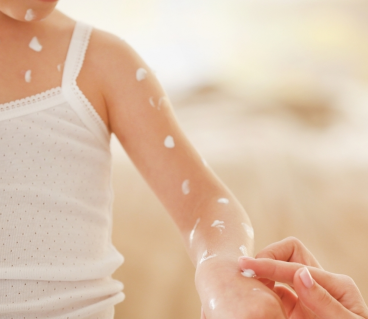How should you manage chickenpox (without complications) in your baby or child?

Chickenpox is a highly contagious viral disease caused by the herpes zoster virus, which also causes shingles. It mainly affects children but can also affect adults who were not exposed to the virus as children.
Symptoms of chickenpox often begin with fever, aches and pains, and a rash that develops into itchy, fluid-filled blisters. Vesicles can appear all over the body, including the face, scalp and genitals.
Management of chickenpox aims to relieve symptoms and prevent complications.
Our advice for better chickenpox management
Cleansing
Cleansing with soap and water
Why?
Cleansing with soap and water, rinsing well, and drying carefully is the first step in any local treatment.
How?
- One to two showers a day with water that's not too hot (37°C)
- Opt for dermatological liquid soaps
- Gently pat skin dry with a towel
- Avoid rubbing and prolonged bathing, which can slow down the drying of scabs
Fever
Antipyretic treatment
Why?
To bring down fever
How?
- Only paracetamol is safe to use.
- Aspirin should be avoided (risk of Reye's syndrome).
- Ibuprofen and other NSAIDs, suspected of increasing the risk of severe bacterial superinfection or necrotic varicella, should be avoided.
Application
Apply a drying product
Why?
To limit excess exudation
How?
- Dries out chickenpox blisters and soothes pruritus
- Promotes healing
- For use once possible infection has been ruled out
Itching
Reduce itching
Why?
Scratching the vesicles will puncture them and risk superinfection, leading to unsightly scars.
How?
- Take an antihistamine, preferably a 2nd-generation one
- Cut nails short
- Try socks and gloves/mittens on your hands
Isolation
Isolation
Why?
To avoid contaminating those around you
How?
- Contagiousness is highest 2 days before and 6 days after the onset of the rash. However, total isolation until clinical recovery (disappearance of scabs) is not mandatory.
- Community exposure is not advisable in the acute phase of the disease.
- Inform staff and families of the presence of cases in the community.
- Immunosuppressed children, pregnant women and adults who have not had the disease (negative serology) should seek prompt medical advice if they have been in contact with the patient.
- If the patient is a member of a closed community with at-risk individuals, they should be quarantined, and if they are a healthcare worker, they should stay out of the community during the contagious period.
Related product
Doctor's stamp
Want to read on?
This access is reserved for professionals, registered on Pierre Fabre For Med.
To access the full content, please register or log in if you already have an account.